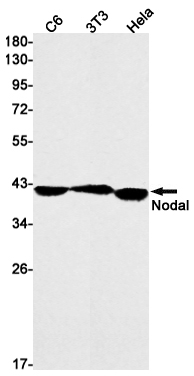
| WB | 1/500-1/1000 | Human,Mouse,Rat |
| IF | 咨询技术 | Human,Mouse,Rat |
| IHC | 咨询技术 | Human,Mouse,Rat |
| ICC | 技术咨询 | Human,Mouse,Rat |
| FCM | 咨询技术 | Human,Mouse,Rat |
| Elisa | 咨询技术 | Human,Mouse,Rat |
| Aliases | HTX5 |
| Entrez GeneID | 4838 |
| WB Predicted band size | Calculated MW: 40 kDa; Observed MW: 40 kDa |
| Host/Isotype | Rabbit IgG |
| Antibody Type | Primary antibody |
| Storage | Store at 4°C short term. Aliquot and store at -20°C long term. Avoid freeze/thaw cycles. |
| Species Reactivity | Human,Mouse,Rat |
| Immunogen | A synthetic peptide of human Nodal |
| Formulation | Purified antibody in TBS with 0.05% sodium azide,0.05%BSA and 50% glycerol. |
+ +
以下是关于Nodal抗体的3篇代表性文献,涵盖其功能研究及疾病关联:
---
1. **文献名称**:*Nodal signalling in embryogenesis and tumourigenesis*
**作者**:C. Strizzi, D.S. Salomon, C. Bianco
**摘要**:该研究综述了Nodal蛋白在胚胎发育中的核心作用(如干细胞多能性调控和胚胎轴向形成),并探讨其在癌症(如黑色素瘤、乳腺癌)中的异常表达。Nodal抗体被用于阻断其信号通路,抑制肿瘤细胞侵袭和血管生成,提示其作为癌症治疗靶点的潜力。
---
2. **文献名称**:*Antibody-mediated blockade of Nodal inhibits tumor cell growth and survival*
**作者**:J.M. Topczewska et al.
**摘要**:研究发现,使用Nodal特异性抗体可显著抑制黑色素瘤细胞的增殖和存活。实验表明,Nodal通过激活SMAD2/3通路促进肿瘤生长,而抗体干预可下调此通路,并增强化疗敏感性,为Nodal靶向疗法提供了实验依据。
---
3. **文献名称**:*Nodal as a biomarker for hepatocellular carcinoma progression*
**作者**:L. Quagliata et al.
**摘要**:该研究通过免疫组化分析发现,Nodal在肝细胞癌(HCC)组织中高表达,且与患者生存率负相关。使用抗Nodal抗体可抑制HCC细胞的迁移和侵袭能力,提示其作为HCC诊断标志物及治疗靶点的双重价值。
---
**备注**:以上摘要为简化概括,具体研究细节需参考原文。如需扩展文献范围(如胚胎发育机制或特定癌症类型),可进一步补充。
Nodal antibodies are immunological tools designed to target Nodal, a secreted protein belonging to the transforming growth factor-beta (TGF-β) superfamily. First identified for its critical role in embryonic development, Nodal governs cell fate decisions, tissue patterning, and left-right asymmetry establishment. It signals through a receptor complex involving Activin type I/II receptors and co-receptors like Cripto-1. activating Smad2/3 pathways to regulate gene expression. Dysregulation of Nodal has been implicated in pathologies, including cancer, where it promotes tumor invasiveness, stemness, and angiogenesis.
Nodal antibodies are widely used in developmental biology, cancer research, and stem cell studies to detect protein expression, localization, and functional modulation. Polyclonal and monoclonal variants enable applications such as Western blotting, immunohistochemistry, and immunofluorescence. Their development was driven by the need to dissect Nodal's spatiotemporal dynamics and its cross-talk with pathways like Wnt and Notch. Recent studies highlight Nodal's re-emergence in certain cancers, making these antibodies valuable for diagnostic or therapeutic exploration. Challenges persist in specificity due to structural homology with other TGF-β members, necessitating rigorous validation. Overall, Nodal antibodies remain pivotal in unraveling the protein's dual roles in embryogenesis and disease.
×